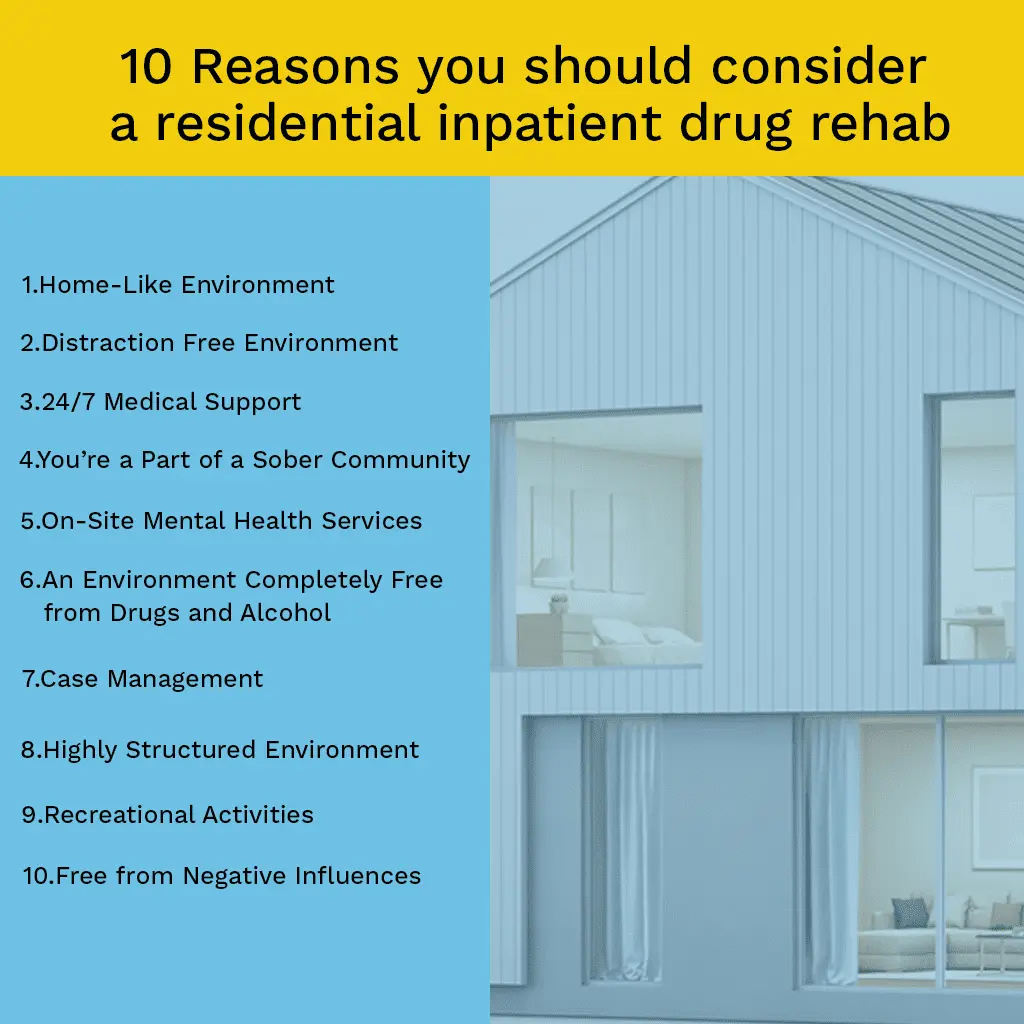
Whether you are just now considering getting clean off drugs and alcohol or wondering what your next step after detox treatment is, finding a quality Residential Inpatient Program can really lay the foundation for the rest of your addiction recovery.
For those struggling with severe addiction, Residential Inpatient Drug Rehab takes all the existing benefits of a traditional inpatient program while bringing in life and inspiration. Here are the top 10 reasons you should consider a residential inpatient drug rehab.
1. Home-Like Environment
Drug Rehabilitation can be stressful, not only due to physical and psychological withdrawals, but also because of low morale. Inpatient treatment that takes place in sober living housing helps to solve this problem by offering a more natural and socially stimulating environment.
2. Distraction Free Environment
Life’s many challenges can make it difficult to focus on other things that are important. Responsibilities like work kids and bills are important, but they can make it an inconvenient time to tackle your drug addiction.
Since Inpatient Drug Treatment Programs are full time, they allow you to remove yourself from life’s distractions so that you can focus on developing the skills and clarity of mind to maintain sobriety and secure a better future.
3. 24/7 Medical Support
Quality residential inpatient programs offer access to highly trained medical support staff who are available to tackle any health-related situations that arise.
As part of the onboarding process, clients receive a medical evaluation to determine their current level of overall health as well as any nutritional or medication related assistance they might need.
Around-the-clock medical support is important for individuals experiencing physical and psychological withdrawal symptoms, underling health conditions, or need on site medication services.
4. You’re a Part of a Sober Community
In a residential inpatient program, there are so many opportunities to learn from others and build lasting relationships.
During your time in a residential rehab, you will share a common space and attend programs with others in recovery. Unlike family, who can be supportive but ultimately unaware of the challenges of addiction recovery, your fellow inpatients share similar experiences and goals.
5. On-Site Mental Health Services
Many that develop substance use disorder (SUD) have underling mental health challenges that can get in the way of recovery. It is, for instance, very common for alcohol and drug users to self-medicate for trauma, anxiety and depression instead of seeking mental health resources.
To get to the bottom of why a person is using, residential inpatient programs offer a plethora of mental health resources including:
- Group and individual counseling
- Family therapy
- Contingency Management
- Behavioral therapies such as: Cognitive Behavioral Therapy (CBT); Dialectical Behavioral Therapy (DBT); and Rational Emotive Behavior Therapy (REBT)
- 12 step and other alternative therapies
- Recreational therapies (art, yoga and meditation, etc.)
- Psychiatric evaluation and support
6. An Environment Completely Free from Drugs and Alcohol
Addiction has been commonly described as a chronic relapsing disorder. This means the person lacks the control stop using even when they want to quit. In order to break that cycle, it is often necessary to remove oneself from the environment that makes access to drugs possible.
Inpatient programs are secure environments that are virtually relapse proof. This gives you the optimal space and time to develop the skills necessary to maintain sobriety as you step down to an outpatient program and prepare to resume your normal life.
7. Case Management
After detox, the next important thing is determining your treatment path. Case managers are social workers, counselors or therapists who specialize in addiction treatment.1 In an inpatient setting, they use their expertise to:
- Provide an initial assessment of the patient
- Determine the best use of time and available resources to maximize treatment outcome
- Modify your treatment plan as needed
- Evaluate your progress
- Help you incorporate multidisciplinary aspects into your addiction treatment plan
- Determine insurance eligibility and additional resources to pay for treatment.
8. Highly Structured Environment
In a residential inpatient environment, every day is carefully planned. This is no accident, since such a large part of recovery rests on developing new habits that support healthy behaviors.
In a typical day at a residential addiction center, many hours are spent working through issues in group and individual therapy, as well as addiction education and skill development which teach you how to effectively manage cravings and triggers.
While schedules are often structured to meet individual needs, residential inpatient programs also prioritize social development through group activity and providing plenty of group down time and recreation.
9. Recreational Activities
With Addiction Treatment, some days will always be better than others. To combat burnout, alleviate stress and promote a healthier lifestyle, residential programs offer facilities such as pools, gyms, tennis courts and entertainment areas with TVs and board games.
As everyone is different, and programs can be strict about what personal items can be brought in, it’s important that addiction programs help provide activities for everyone.
10. Free from Negative Influences
Not everybody entering addiction treatment has a great home life. Some come from households that are emotionally or physically abusive, or they may live with others or have close friends that are abusing drugs and alcohol.
Significantly, inpatient programs provide a crucial service for individuals who would lack strong emotional and social support on the outside by connecting them to a social support network within the sober community and providing them with resources to help them take control of their sobriety.
Are you or a loved one seeking help for a drug or alcohol addiction? Golden Road Recovery is an addiction rehabilitation center operating in Chatsworth, California. Our expert team provide detox and Residential Inpatient Treatment for a variety of different substance use disorders. Call us Today at (877)-372-0536.
[gravityform id=”7″ title=”true” description=”true”]




